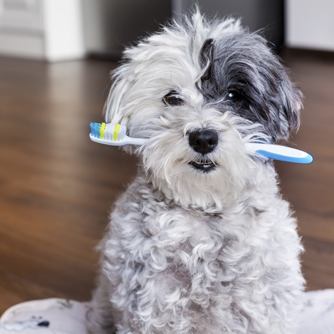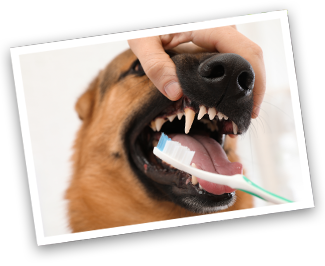Caring For Your Pet’s Teeth at Home

It is very important to your pet’s health to receive regular dental home care just as you take care of your own teeth. Animals have no special ability to resist dental disease. The following guidelines can be used to help keep your pet's teeth healthy.
1: Examining and Touching the Teeth and Gums Weekly
The first step is to make it fun and relaxing for your pet. Use lots of praise and start slowly. Begin by offering a small amount of flavored pet toothpaste on your finger as “a treat” daily for 5-7 days. This conditions your pet to expect a treat when they see the tube of toothpaste.
2: Brushing with a Veterinary Toothpaste
After this initial introductory period, as you give the paste, use your index finger to rub the teeth and gums in small circles, the same motion as a toothbrush. Continue this for 5-7 days. Once your pet becomes comfortable with this, then progress to a soft bristle brush and continue the same routine. You may want to offer a small amount of the paste before and after brushing as a reward. Some pets will require daily brushing, while others can be maintained by brushing a few times a week. Human toothpaste should never be used - it is not meant to be swallowed and can lead to problems if used in dogs and cats.
3: Antiseptic Oral Rinse
These rinses are not as well liked as the flavored toothpastes and will not remove plaque as well as brushing, but they will help reduce plaque bacteria.
4: Treats
There are products that have been proven in clinical trials to reduce plaque and tartar accumulation. Look for the Veterinary Oral Health Council (V.O.H.C.) Seal of Approval on products to ensure that are beneficial for your pet’s dental health.
Avoid hard treats such as real bones, hard plastic, cow hooves - if your fingernail can not put a dent into it - DO NOT offer it.
5: Diets
Specially formulated diets are available that help reduce plaque and tartar build-up. Hill’s Prescription t/d diet works mechanically to “brush” the teeth when chewing. The t/d diet can be fed as the sole diet, or as treats.
If you find you cannot perform dental home care on your pet, and you want to keep your pet healthy and avoid bad breath and dental disease, you MUST seek professional treatment more frequently! For most pets a professional cleaning once a year is adequate. Pets with pre-existing dental disease and those lacking dental home care will need professional care more often.

